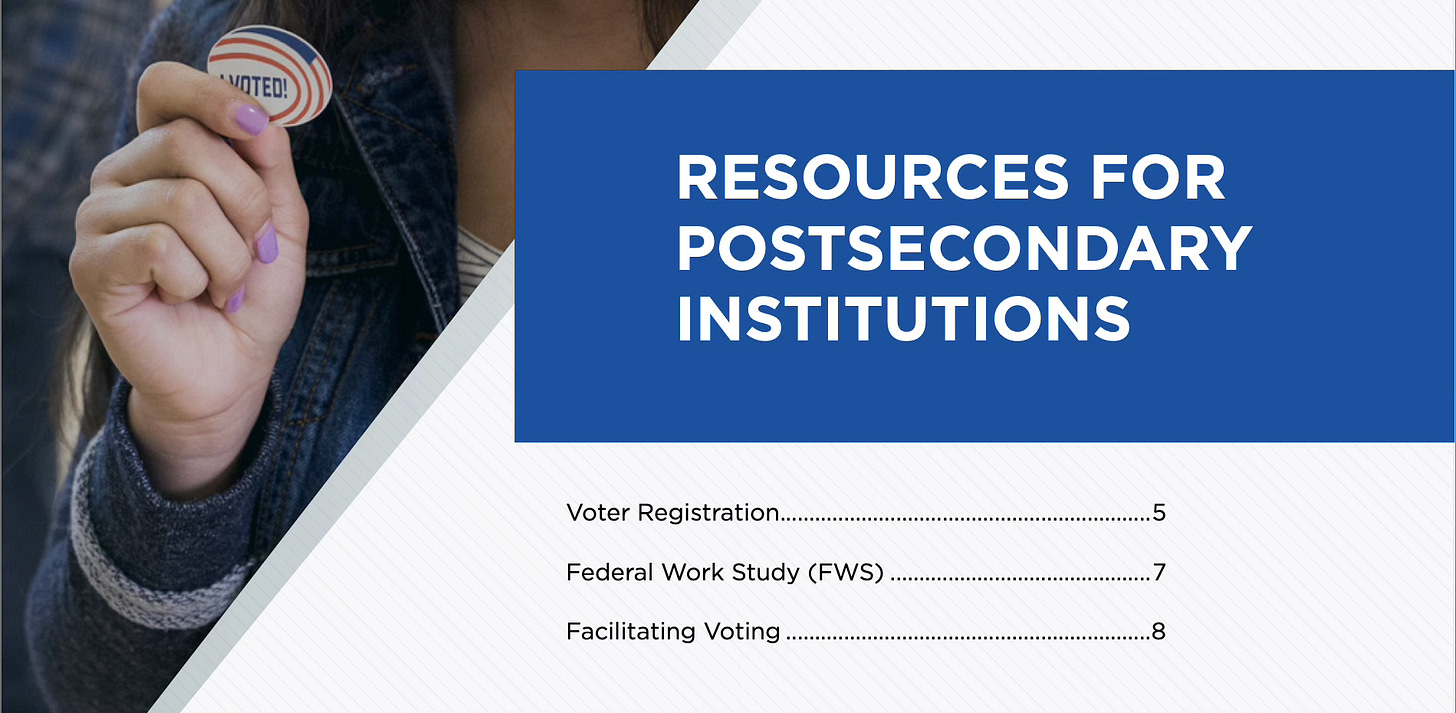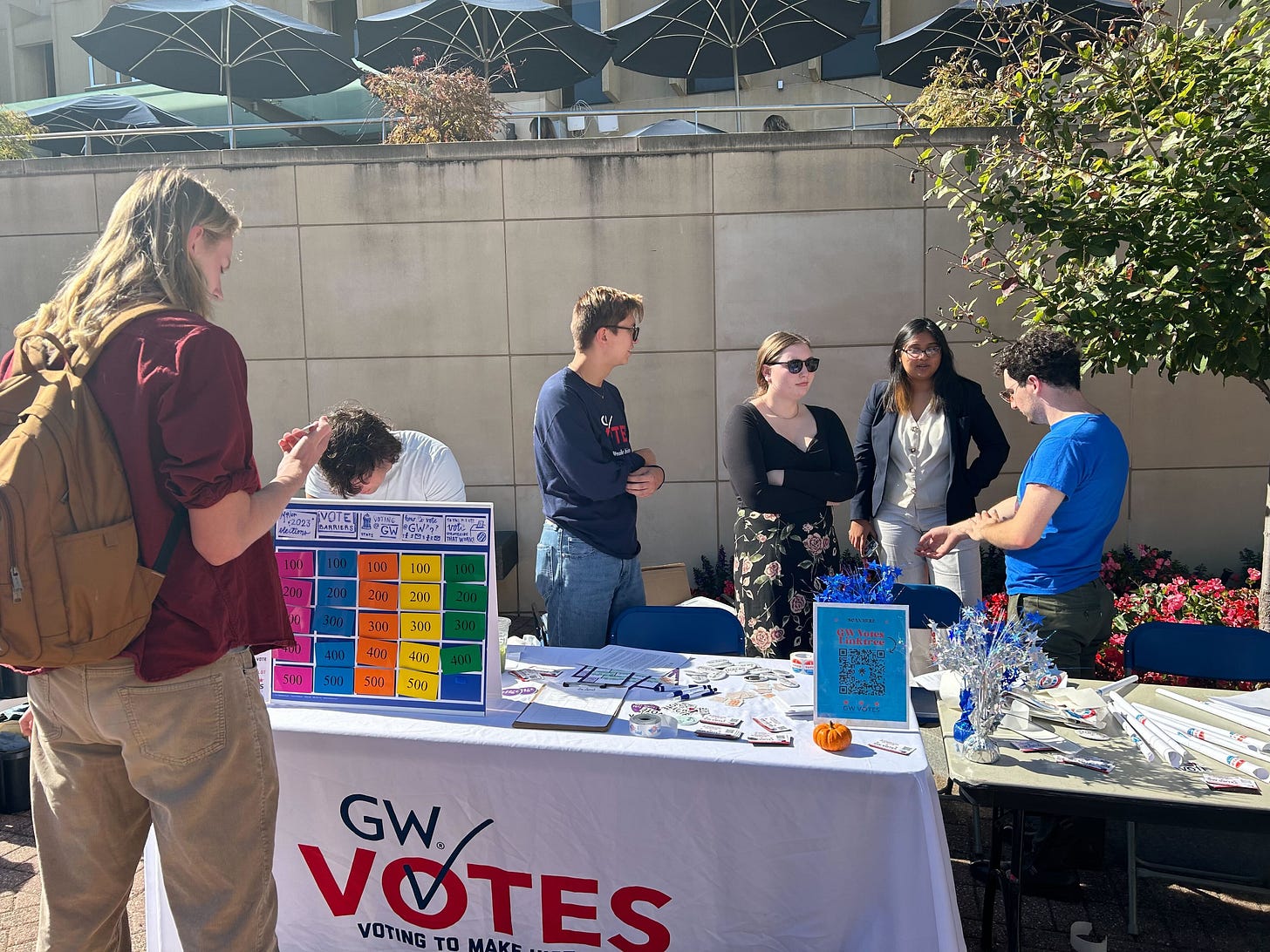Using Federal Work-Study funds for nonpartisan student voter engagement: A primer
Recent Department of Education guidance clarifies an opportunity for postsecondary institutions
The Federal Work-Study (FWS) Program is a crucial federal initiative that assists students in financing their education by providing part-time employment opportunities. Recently, the Department of Education clarified that FWS funds can be used for nonpartisan voter registration activities, opening up new avenues for promoting civic engagement on college campuses.
The FWS Program requires institutions to apply annually, with the U.S. Department of Education allocating funds based on previous funding levels and aggregate student need. In most cases, institutions must pay up to a 50% share of student wages, while allocating at least 7% of FWS funds to community service jobs such as tutoring and emergency preparedness. However, campuses that establish FWS positions for nonpartisan student voter registration work may be eligible to receive up to 100% reimbursement from the federal government.
The FWS program benefits students by providing valuable work experience and income to cover educational costs, while also benefiting institutions and employers by offering quality employment opportunities, often aligned with students' career paths.
Department of Education Clarification

In February, the Department of Education issued a “Dear Colleague” Letter clarifying that FWS funds may be used for employment by public agencies for civic engagement work, including voter registration, get-out-the-vote activities, voter assistance, and poll worker positions. This letter combined with the U.S. Department of Education Toolkit for the Promotion of Voter Participation for Students, provided further guidance for campuses to implement FWS positions for nonpartisan student voter engagement.
The toolkit offers recommendations and examples from several institutions, including Florida International University, Northwestern University, Alabama A&M University, and Simpson College, on implementing FWS funds to pay students for voting and election-related work. Their success stories demonstrate how FWS funds can be effectively utilized to enhance civic engagement and empower students to participate in the democratic process.
While the extent of current FWS use for voter registration is unknown, this clarification is likely to increase its utilization. Higher education personnel can take advantage of this by establishing or expanding FWS positions dedicated to nonpartisan voter registration efforts, such as campus voter drives, poll worker recruitment, and voter education initiatives. The Implementation Toolkit for Federal Work-Study for Voter Registration (created by the Students Learn Students Vote Coalition, ALL IN Campus Democracy Challenge, and the Fair Election Center’s Campus Vote Project) provides guidance on how to do this.

Key Aspects of the Federal Work-Study Program: Seven facts you and your students need to know
Acceptance is just the first step: Once eligible students accept Federal Work-Study funds offered to them, in order to actually receive the funds, they must find and be hired for a work-study job, often through applying and interviewing like a regular job. Your institution’s financial aid office is likely where these jobs are posted and where students would look for information on applying to new or existing positions.
Not just on-campus opportunities: Work-study jobs can be on-campus, but they also include off-campus community service positions at public or non-profit organizations, such as tutoring at local schools. The ED clarification states that working for a Secretary of State or local election official’s office can be funded by FWS.
Funds are received as paychecks, not tuition credits: Unlike some aid, work-study earnings don't get applied directly to tuition and fees. Students receive paychecks based on hours worked, meant to help cover day-to-day expenses rather than large costs like tuition and housing.
Positions may be limited: If your school lacks sufficient work-study funding or job openings, students may be able to work regular on-campus jobs without being awarded work-study. Check with the student employment office on your campus to find out what is available.
Students must reapply each year: Several factors determine yearly work-study eligibility, like financial need, prior fund usage, and your school's allocation. Filing the FAFSA early and indicating interest can improve their chances but doesn't guarantee an award.
Pay Varies Based on Position: Pay rates differ based on the job's duties, required qualifications, your school's pay policies, and state minimum wage laws.
Hours worked may vary: While hours can vary, most work-study jobs accommodate class schedules, typically requiring 10-20 hours per week.
The Federal Work-Study Program can provide valuable work experience and financial support for eligible students. However, navigating the changes and nuances of the program is essential to make the most of this opportunity.
How to advocate for using FWS for nonpartisan voter registration programs at your institution
Using FWS funds for nonpartisan voter registration programs at a postsecondary institution involves several key steps to ensure the funding is properly allocated and effectively deployed (you can find guidance on each within the FWS Implementation Toolkit).
Account for the FAFSA Simplification Act: Currently being implemented for the 2024-25 academic year, the FAFSA Simplification Act will necessitate changes to the overall FWS application process, while also expanding the pool of students eligible for FWS positions - which will, in turn, necessitate awareness campaigns among the student body to ensure those eligible for the work understand their opportunity. Complications and delays due to the FAFSA Simplification Act’s implementation will also likely be a drain on capacity in financial aid offices throughout the country, meaning that in many cases personnel who would ordinarily be able to devote time to processing a FWS proposal will have less ability to do so in the coming weeks and months.
Educate all relevant stakeholders: The work of effective nonpartisan student voter engagement involves collaboration with personnel at several organizational levels within a typical postsecondary institution, from campus administrators, to faculty, staff, and student organizations. Engaging with the right people at each level to explain the potential impact of FWS-funded voter registration positions, and the specific responsibilities of the students employed using these funds, will help pave the way for their effective use.
Create a proposal: A successful proposal will spell out the need for nonpartisan student voter engagement work at your institution, and how the FWS-funded position will meaningfully enhance that work. Be sure to highlight successful examples from other institutions that have implemented FWS-funded student voter outreach (which can be found in the FWS Implementation Toolkit).
The Upshot
The Department of Education's clarification and the current/incoming FWS policies present a significant opportunity to bolster efforts towards achieving 100% student voter participation. By leveraging FWS funds to hire and engage students in nonpartisan voter registration, education, and get-out-the-vote initiatives, institutions can foster a culture of civic engagement and empower students to be active participants in the democratic process. As campuses adapt to the evolving FWS landscape, strategic utilization of these resources can help them maximize this opportunity.



